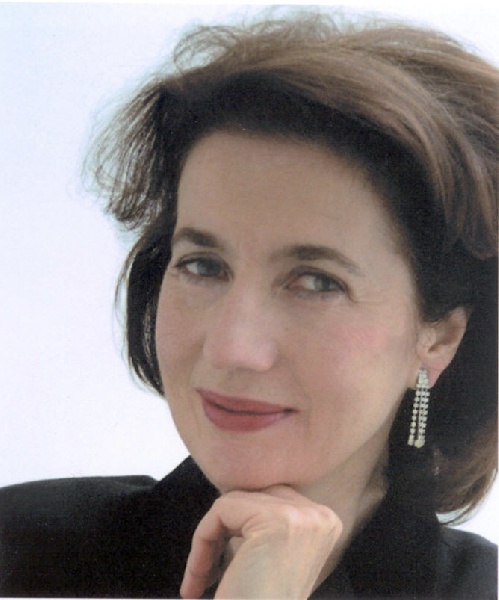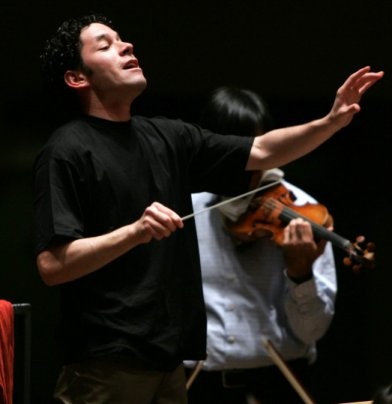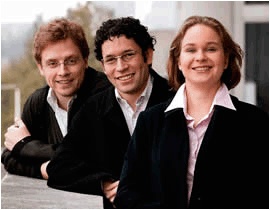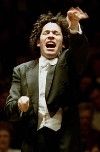Beethoven, Falla, and Bernstein Alive at Tanglewood
Imogen Cooper and Gustavo Dudamel in an Outstanding Evening
By: Michael Miller - Aug 26, 2006
Tanglewood, Friday, August 25, 2006 8:30 PM
Boston Symphony Orchestra, Gustavo Dudamel, conductor; Imogen Cooper, piano; Isabel Leonard, mezzo-soprano:
Bernstein, Overture to Candide; Beethoven, Piano Concerto No. 1 in C Major, Op. 15; Falla, "The Three-cornered Hat" (Complete)
Anyone who missed the splendid concert by the BSO under the direction twenty-sx-year old Venezuelan conductor Gustavo Dudamel has every reason to regret it. Mr. Dudamel has been in the news as one of the most promising young musicians in the world today, and in Friday's concert he surpassed all these expectations—which one is always wise to treat with a grain of salt in any case. After Sunday's routine Brahms for which the visiting conductor, Pinchas Steinberg, had repositioned the first and second violins on the left and cellos and double-basses on the right, it was a relief to see the strings sitting in their usual configuration, which makes a significant difference in the clarity of the ensemble.
The concert began with Leonard Bernstein's effervescent "Candide" overture. It felt as if Rossini had come back to life and were strolling through the streets of Manhattan, sharing his seasoned European witticisms with us in contemporary American. The music was entirely alive. Mr. Dudamel set it going at a rapid clip and maintained the fast tempo throughout, keeping the running pulse, even in passages that are usually allowed to relax a bit more. The BSO followed him enthusiastically all the way, and even with the huge orchestra and complex textures, the music never sounded thick or rushed. Mr. Dudamel earned an enthusiastic ovation and created a mood of high spirits which lasted the entire evening.
The next piece was the first of three Beethoven piano concertos which we will hear over the course of this final weekend of the Tanglewood season, Beethoven's First with the distinguished English pianist, Imogen Cooper, whose performances of Mozart, Beethoven, and Schubert have earned her considerable respect. She has also won high praise for her playing of the fortepiano. Here Mr. Dudamel showed himself to be fully comfortable with a switch back into the idiom of the mid-1790's, when Joseph Haydn, the organizer of the concert in which Beethoven himself first played it, dominated musical taste. Under his direction the BSO's playing was exquisitely detailed. The various sections and the instrumental soloists interacted with each other and Miss Cooper with an alertness and sensitivity alive enough for chamber music. Balances were also sensitively managed from the lighter to the more massive combinations of instruments. Through this Mr. Dudamel produced an individual sound of his own from the orchestra. Especially pleasing was his particular treatment of brass and wind combinations, in which the interplay of clarinets and trumpets was particularly striking. Miss Cooper and Mr. Dudamel favored a brisk tempo throughout, but neither were inclined to push it. In fact, Mr. Dudamel relaxed the tempo of the lyric second subject of the first movement quite a bit, and the music never lacked space to breathe. Both orchestra and soloist seemed to enjoy Mr. Dudamel's contribution, and everyone's playing was infected with his high spirits. Miss Cooper made the most of her responsive accompaniment, chatting with the orchestral soloists and dancing with the conductor's pulse, as if she were in just the right company for her interpretation of the concerto. Her technique is impressive, but she didn't make a fetish of it, relaxing and blurring her usually precise passage work and phrasing when the music called for it. Both she and Mr. Dudamel understood the value of extremely soft pianissimi and delicate coloration in contrast to her robust fortissimo chords. She played Beethoven's third cadenza, the most elaborate and often-played of them, which he composed over a decade later in his style of that time. There was no dragging in the Largo, but nothing perfunctory either: the tempo seemed quite perfect, and the final rondo was a marvel of energy and good cheer with every detail lovingly cultivated. The sensitivity and pacing of its coda was amazing.
Mr. Dudamel returned to the twentieth century in the second half of the program with a complete performance Manuel de Falla's ballet, the "Three-Cornered Hat." Every bar was a joy of wit and musical invention. Again Mr. Dudamel's fast tempo sacrificed nothing of orchestral clarity or the vast gamut of tone-colors. He showed himself to be a genius of shifting meters and tempo, and the orchestra seemed to be having great fun throughout. His fluency in tempo and his sense of pauses and timing brought out the essence of the music: in this ballet Falla was not so much writing colorful dances as telling a story in music. The effect was so vivid that we hardly missed stage, sets, or corps de ballet. Mezzo-soprano Isabel Leonard used her rich silver voice with understanding and wit.
A great evening like this shouldn't be missed, and it came with a splendid Beethoven performance by a pianist who is not heard in this country nearly often enough as well as the important debut of a young conductor with a very engaging personality entirely own, who will be very famous very soon.
http://homepages.nyu.edu/~mjm11/index.html
michaeljames48@gmail.com




